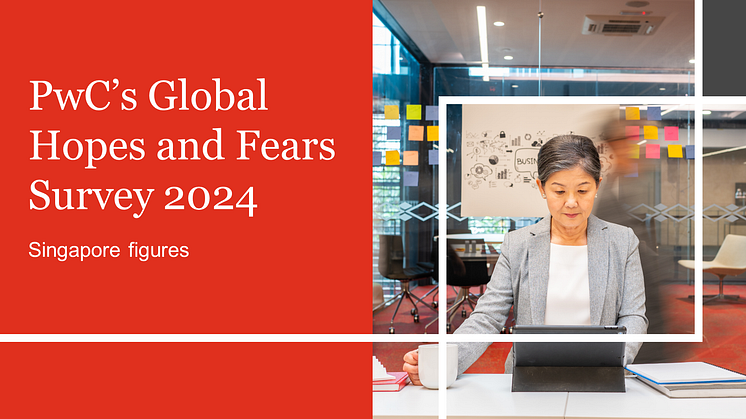
Press release -
Workers in Singapore embrace AI and prioritise skills growth amid rising workloads and an accelerating pace of change: PwC's 2024 Global Workforce Hopes & Fears Survey
- Almost half of workers in Singapore (47% vs 45% globally) say their workload has increased significantly in the past year, as around two-thirds (68% in Singapore vs 62% globally) say the pace of change at work has increased over the same time
- One-third in Singapore (34% vs 28% globally) say they are very or extremely likely to switch employer in the next 12 months – a higher proportion than during the ‘Great Resignation’ (21% in Singapore vs 19% globally) in 2022
- Employees prioritise skills-growth and Singapore employers are ahead of global counterparts when it comes to providing upskilling or reskilling opportunities: more than half of Singapore respondents (56% vs 46% globally) strongly or moderately agree that their employer provides adequate opportunities to learn new skills. This is particularly important for workers considering leaving: More than two-thirds in Singapore (72% vs 67% globally) say opportunities to learn new skills are a key factor in any decision to job-switch
- 65% of workers surveyed in Singapore (more than 80% globally) who use generative AI daily expect it to make their time at work more efficient in the next 12 months. More than half of Singapore workers (59% vs 49% globally) expect it to lead to higher salaries
- Globally, cost-of-living pressures ease slightly: the proportion of Singapore workers with money left over each month rises to 65% (up from 44% in 2023 vs 45% globally, up from 38% in 2023). Less workers in Singapore (34%) are financially stressed compared to their global counterparts (52%)
FOR IMMEDIATE RELEASE - Singapore, 25 June 2024 – Among 1,000 workers surveyed in Singapore, many say they are prioritising long-term skills growth to accelerate their careers amid rising workloads and heightened workplace uncertainty, according to PwC’s 2024 Global Workforce Hopes & Fears Survey, published today.
In the last 12 months, nearly half of workers surveyed (47% in Singapore vs 45% globally) say they have experienced rising workloads and an accelerating pace of workplace change. Over two-thirds in Singapore (68% vs 62% globally) say they have experienced more change at work in the past year than the 12 months prior, with over two-fifths (44% in Singapore vs 40% globally) noting their daily responsibilities have changed to a large or very large extent. More than half in Singapore (54% vs 44% globally) don’t understand the purpose of changes taking place, suggesting a workforce caught between today and tomorrow.
In the midst of this growing mix of employee pressures, the findings suggest workers are alert to opportunities elsewhere, and are highly focused on skills growth and embracing AI.
A third in Singapore (34% vs 28% globally) say they are likely to switch employers in the next 12 months, a percentage far higher than during the ‘Great Resignation’ (21% in Singapore vs 19% globally) of 2022. Majority of Singapore respondents (72% vs 67% globally) who are considering moving say skills is an important factor in their decision to stay with their current employer or switch to a new one.
Martijn Schouten, Workforce Transformation Leader, PwC South East Asia Consulting, said:
“As workers face heightened uncertainty, rising workloads and continue to face financial stress, they are prioritising skills growth and embracing new and emerging technologies such as GenAI to turbocharge their growth and accelerate their careers. The findings suggest that job satisfaction is no longer enough. Employees are placing an increased premium on skills growth in a climate characterised by constant technological change. Employers must ensure they are investing in their employees and technological platforms to mitigate employee pressures and retain the brightest talent.”
Workers embrace AI to ease workplace pressures and unlock personal growth
As employees face heightened workplace pressures, they are also turning to new and emerging technologies such as GenAI to help. Among those employees who use GenAI daily, over six in 10 Singapore respondents (65% vs 82% globally) expect it to make their time at work more efficient in the next 12 months.
Employees are also optimistic about opportunities for GenAI to support their growth. Close to six in 10 of all users surveyed in Singapore (59%, vs 49% globally) expect GenAI to lead to higher salaries – an expectation that’s even higher (81% in Singapore vs 76% globally) among employees who use the technology daily. Meanwhile, over eight in 10 users agree that GenAI tools will create opportunities to be more creative at work (84% in Singapore vs 73% globally) and improve the quality of their work (83% in Singapore vs 72% globally).
Said Noel Goh, Workforce Rewards Leader, PwC Singapore:
“Beyond the ability to improve work efficiency and quality, Singapore employees are also optimistic about upskilling in GenAI because they see it as a pathway to higher salaries which can help alleviate cost of living pressures that they are feeling. This mindset is healthy for both the individual and the employers, and also beneficial in moving Singapore’s workforce up the productivity value chain. It is therefore critical for leaders to understand this mindset.
“In addition, the survey also found that fair pay is highly important for Singapore employees with eight in 10 or 80% agreeing to this. This should not be surprising given the systemic increase in cost of living across the world. To effectively retain and recruit their most valued employees, employers should bear this in mind when designing or optimising their rewards and benefits structures."
The skills imperative
More than half (56%) of all employees surveyed in Singapore moderately or strongly agree that their employer provides adequate opportunities to learn new skills that will be helpful to their careers; this is slightly ahead of their global counterparts at 46%.
Employees who are likely to leave in the next year may be more attuned to skills changes that are needed than the general workforce, with over half (55% in Singapore vs 51% globally) moderately or strongly agreeing that the skills their job require will change in the next five years compared to those unlikely to change employer (36% in Singapore vs 29% globally).
There is particular interest in the impact of AI on skills development, with 84% of Singapore respondents (vs 76% globally) expecting it to create opportunities to learn new skills at work. However, employers will need to invest heavily in new and emerging technology training and access. Among employees who have not used GenAI at work in the last 12 months, less than one-third in Singapore (28% vs 33% globally) don’t think there are opportunities to use the technology in their line of work, while 34% (24% globally) don’t have access to the tools at work, and 24% (23% globally) don’t know how to use the tools.
Amid the pace of change, around six in 10 (63%) Singapore workers expressed at least moderate job satisfaction which is similar to the 2023 survey findings (at 66%, vs 60% globally which went up from 56% in 2023). Cost-of-living pressures have shown to eased since 2023. The proportion of workers in Singapore with money left over each month has risen to 65%, up from 44% in 2023 (globally 45%, up from 38% in 2023). Meanwhile, a third of workers surveyed in Singapore (34%) say they are still financially stressed to some degree, a lower percentage compared to their global counterparts (52%).
-------------------------- ENDS ----------------------------
Notes to Editors:
About the PwC Global Hopes and Fears Survey 2024 - Singapore figures
In March 2024, PwC surveyed 56,600 individuals across 50 countries and territories who are in work or active in the labour market. Of the survey respondents, 1,000 individuals are based in Singapore. The sample was designed to reflect a range of industries, demographic characteristics and working patterns. You can read the full report on pwc.com.
About PwC
© 2024 PwC. All rights reserved. PwC refers to the PwC network and/or one or more of its member firms, each of which is a separate legal entity. Please see www.pwc.com/structure for further details.
Related links
Topics
Categories
About PwC
At PwC, our purpose is to build trust in society and solve important problems - this is at the core of everything we do from the value we provide to our clients and society to the decisions we make as a firm.
Our services started with audit and assurance over a century ago. As times change and the issues faced by businesses and individuals evolved, we have developed specialised capabilities in tax, advisory and consulting to help you address emerging new challenges across focus areas like ESG, sustainability and climate change, digital transformation, cyber security and privacy, data, mergers and acquisitions, and more.
In Singapore, we have more than 3,500 partners and staff to help resolve complex issues and identify opportunities for public, private and government organisations to progress. As part of the PwC network with more than 364,000 people in 151 countries, we are among the leading professional services networks in the world focusing on helping organisations and individuals create the value they are looking for.
© 2024 PwC. All rights reserved


